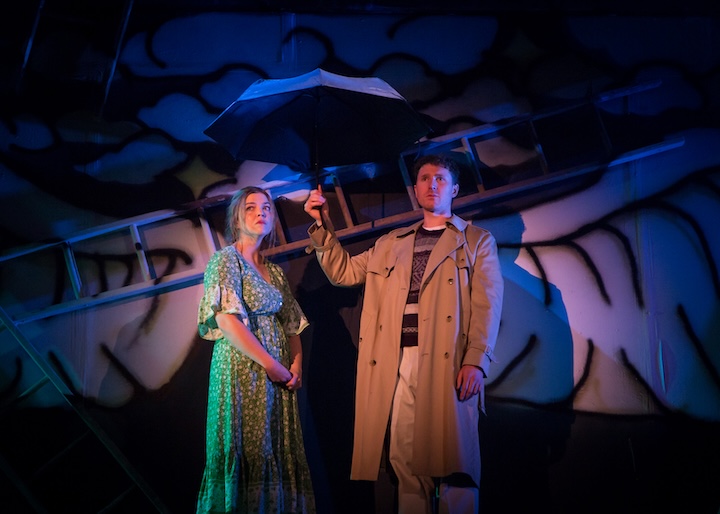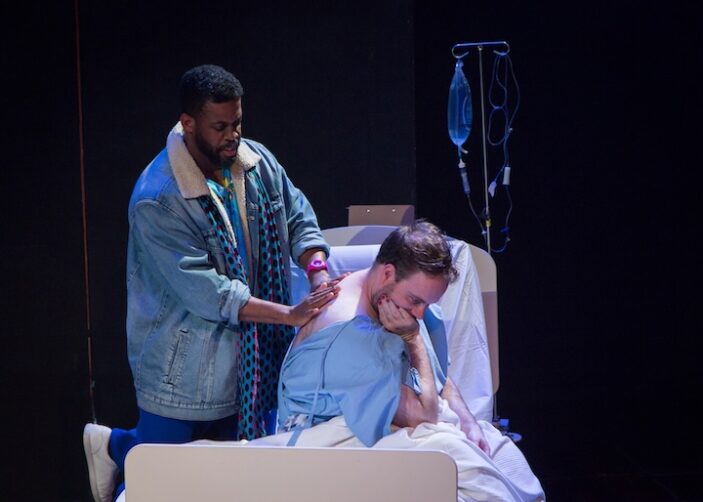
Angels in America: A Gay Fantasia on National Themes is an ambitious two-part play by American Playwright Tony Kushner. Written in 1991, the story explores personal motivations, hopes and desires of characters in New York during the 1980’s AIDS crisis. It has had previous success as a six-part television mini-series and a West End production. The University of Adelaide Theatre Guild have created a winner with this production in the intimate Adelaide University Little Theatre.
The opening scene in Part One: Millenium Approaches, has Rabbi Isidor Chemelwitz, played convincingly by Kate Anolak, delivering an eulogy for an elderly Jewish woman. Bittersweet, yet punctuated with moments of humour, the introduction of the absent woman (an angel it would seem) sets the scene for the following action. The deceased woman is Louis’s mother, and Louis (Lee Cook) and his partner, Prior (Matthew Houston), are introduced to us for the first time just after the funeral. Immediately the tension between them is obvious, Prior sees the occasion as a celebration of life, whereas Louis is keeping up strict Jewish appearances. It’s this tension that drives the narrative throughout the whole play, that is, nothing is shown at face value. There is always some hidden agenda pulling the characters in different directions.
The scene shifts to Roy Cohn’s office with Brant Eustice embracing this loud brash unpleasant lawyer personality perfectly. Young Mormon lawyer Joe Pitt, performed with wholesome passivity by Lindsay Prodea can barely get a word in as Roy holds multiple simultaneous phone conversations. Roy wants Joe to take up a position in Washington. Once again the motivation soon becomes clear that having Joe in Washington would be good insurance for the corrupt Roy. Roy scoffs at the idea that Joe would need to go home and discuss the move with his wife.
Arriving home, Joe greets his wife Harper Pitt, Casmira Lorien encapsulating her valium induced stupor delightfully. She has conversations with imaginary friends such as Mr Lies played by amiable Eric McDowell. It would appear that Harper can also imagine things with spine-chilling accuracy. Confronting Joe with the accusation that he is gay, it seems that she is spot on in her vision. What is reality? What is imaginary? Where do the lines bleed?
Worlds start to unfold as Prior shows Louis his AIDS tumours and is subsequently admitted to hospital. Louis can’t deal with the reality of this situation and runs away to have sex with strangers in the park. Lives become interlinked. Roy is diagnosed with AIDS but refused to admit that he is a homosexual. “I’m a man who just likes to have sex with other men.” By chance, Joe and Louis end up together while Harper imagines herself in Antarctica with Angel Oceania (Eric McDowell).
The actors all take on multiple roles, with Angels becoming more prevalent as the story progresses. Rachel Dolton plays an Angel who visits Prior in hospital and gives him vivid wet dreams. Kate Anolak is a smug and demure Ethel Rosenberg sitting by dying Roy’s bedside. Real life Ethel Rosenberg was convicted by Roy for being a soviet espionage agent and then executed. Playwright Kushner has powerfully weaved events from the eighties into the narrative: Fear of AIDS patients, Reagan’s cold war, Racism and homophobia. On top of this is the thread of themes: intentions, underlying motivations, hopes, fears and redemption.

Director Hayley Norton has flawlessly captured Kushner’s tone and intentions, using humour to deliver powerful and at times, unpleasant messages. With two three hour plays, it would be easy to lose energy, but the pace was sustained easily for both parts. With a minimal stage; props consisting of a hospital bed, a couch and a couple of tables and chairs, what bought the story to life was the accuracy and relevance of the costumes. Costume designer Viktoria Burrett clearly spent many hours repairing, designing and op-shopping to bring the 80’s era to life. With multiple scenes and characters, there were plenty of costume changes and it really enlivened the production. Clever lighting by Mark Oakley focussed the attention where it belonged, often with parallel action on stage.
Part Two: Perestroika begins with a speech given by the world’s oldest living Bolshevik, Aleksii Antedilluvianovich Prelapsarianov, (Kate Anolak) addressing a crowd in Moscow in December 1985. He condemns the reforms proposed by Mikhail Gorbachev, decrying the notion of progress without political theory, and declaring that the only way forward is to not move.
Angels are found everywhere – a kind stranger, a concerned mother, an imaginary friend a dying bedside visitor. After meeting the characters in Part one, their natural progression completes the cycle in Part two. True intentions are exposed, old wounds heal, lovers are torn apart or pardoned. It is an act of redemption. Despite Roy’s abject disgusting tone and racism towards his nurse, he still genuinely manages to care for and help him. In another moving scene, Joe discards his Mormon Temple Garments, exposing himself completely to Louis. However Louis discovers his right-wing anti-gay Republican writings and rejects him.
While two three-hour plays may appear to be overwhelming, the Theatre Guild have managed to present a fast paced, entertaining and thought-provoking adaption of this epic story. The cast carried their performances seemingly effortlessly, with talented support behind the scenes. It is possible to see just one act or the other, but it’s worth the investment to see both.
FIVE STARS (OUT OF FIVE)
Angels in America: A Gay Fantasia on National Themes is performed by the University of Adelaide Theatre Guild at the Little Theatre
Show runs until 25th May – showtimes and tickets here
The reviewer attended on Thursday 2nd, and Friday 3rd May
Warnings: frequent strong language, adult themes, sexual references and nudity. (Age 16+)
Photographer: Richard Parkhill.
